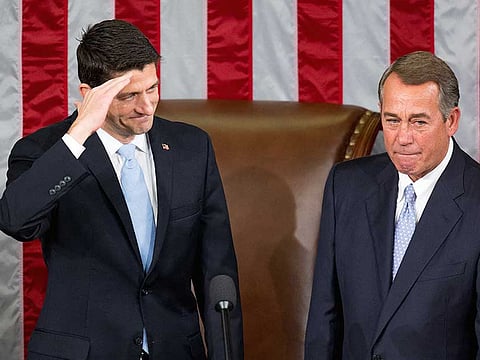Republicans hold their noses at politics
Fair is foul and foul is fair in the GOP firmament, and that promises more political drama in the US in the months to come

This has been a productive week for US Republicans. They settled on a speaker of the House of Representatives, signed off on a federal budget deal and presented another episode of their no-holds-barred “presidential debate” reality television show.
All the activity has led some folks to surmise that the Grand Old Party is getting its act together after a fractious few months in which John Boehner said he would step down as speaker, rebel Republicans in the House threatened to shut down the federal government (again) and the party’s presidential campaign came to be dominated by two political neophytes — Donald Trump, a developer and casino operator turned immigration foe, and Ben Carson, a surgeon adored by Christian conservatives.
But, at least for now, I would argue that this optimistic thesis fails to pass what could be called the Republican smell test. Listen to the actual words being used in the party of Lincoln these days and you hear people disgusted with the politics of our republic. Whether they are dealing with each other or the world around them, Republicans can invariably be found holding their noses. Fair is foul and foul is fair in the Republican firmament, and that promises more political drama — and possibly tragedy — in the months to come.
The prevailing sense of olfactory unease in the party was perhaps captured best by Boehner, an Ohio barkeeper’s son who has displayed a touch of the poet since saying in September that he would quit Congress rather than continue fighting with rebels in his own ranks. Discussing his hopes for a federal budget deal in his final days as speaker, he found a perfectly pungent metaphor to sum up his situation.
“I don’t want to leave my successor a dirty barn,” said Boehner, now 65. “I want to clean the barn up a little bit before the next person gets there.”
Noise reduction
I have never tidied up a farm building myself, but I have stepped in some of the stuff found on the floors of such places, so I caught Boehner’s drift. To him, the Republican insurgents were messing up his joint. Lacking the votes to override the Democratic leader of the executive branch, Barack Obama, they nonetheless faulted their party leaders for dealing with him.
“There are people out there spreading, you know, noise about how much can get done,” was how the ever-tasteful Boehner put it.
Boehner responded with some of the more impressive Capitol Hill “noise” reduction efforts of the Obama era. By announcing his decision to step down, he headed off right wingers who might have tried to scuttle a budget deal by seeking his removal as speaker. They countered by blocking the ascension of Boehner’s heir apparent, the Republican majority leader Kevin McCarthy of California. But, eventually, Boehner had his way: the House approved a budget agreement reached in private by bipartisan negotiators, threw the US business community a bone by voting to reopen the Export-Import Bank and made Paul Ryan of Wisconsin — the 2012 Republican vice-presidential nominee — the new speaker.
Yet completing all that public business didn’t exactly clear the congressional air — a cleaner barn, after all, is still a barn. Although a budget deal will make his life as speaker simpler, Ryan’s initial reaction was to complain about the odour. “I think the process stinks,” he said. Boehner’s response was to agree with Ryan, even to the point of using the same verb. “It stinks,” he said. “This is not the way to run a railroad.”(Historically minded readers might recall that Republicans used to build such things.)
The sense of general disgust with the way things are — and the concomitant rhetorical focus on filth — also marked this week’s Republican presidential debate, which had been billed as perhaps the last big chance for the darling of the Republican establishment, Jeb Bush, the former Florida governor and son and brother of the US presidents number 41 and 43, to break through against Trump and Carson.
It didn’t happen. The Republicans who turned the crowd on were the ones who tore into the media — such as senators Ted Cruz of Texas or Marco Rubio of Florida. Bush, by contrast, came off as Little Lord Fauntleroy set down in a Dirty Harry movie. “I can’t fake anger,” he confessed toward the start of the proceedings. “And it troubles me that people are rewarded for tearing things down.”
All I can say is it was too bad that Willie Horton wasn’t around to provide Bush with a shoulder to cry on (that’s a 1980s joke, kids).
Meanwhile, mentions of excrement returned with all the regulatory of a Wagnerian leitmotif. Reflecting on foreign affairs, Lindsay Graham, the South Carolina senator, said: “Make me commander-in-chief and this crap stops.”
Turning to financial regulation, Carson mused: “All of this ‘too big to fail’ stuff, and picking and choosing winners and losers, this is a bunch of crap.”
Whether they are right or wrong, I think it’s fair to say that our Republicans want to clean things up. At times, however, I find myself wondering whether they are really trying to win back the White House — or would be happier settling into a nice warm bath.
— Financial Times



